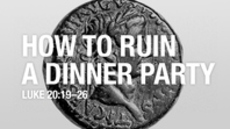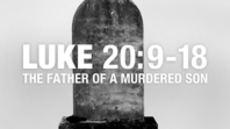The religious leaders in Luke 20:19-26 tried to trap Jesus by asking him whether or not Caesar had the right to tell the people of God what to do, including paying taxes. They were, in a sense, making Caesar out to be the lifeguard of the pool, suggesting that the people of God were bigger than Caesar’s law. And if Jesus were to agree with that, they could accuse him of treason, so they thought they’d trapped him.
But Jesus turns it around and says that rather than the authority coming from the law itself, the authority comes from the image of the higher power. So the coin that bore Caesar’s image reflected his rule over the nation, just like humans who bear God’s image reflect his rule over the people of God. Jesus was actually calling for people who bore the image of God to reflect the image of him in how they related to Caesar.
19 The scribes and the chief priests sought to lay hands on him at that very hour, for they perceived that he had told this parable against them, but they feared the people. 20 So they watched him and sent spies, who pretended to be sincere, that they might catch him in something he said, so as to deliver him up to the authority and jurisdiction of the governor. 21 So they asked him, “Teacher, we know that you speak and teach rightly, and show no partiality, but truly teach the way of God. 22 Is it lawful for us to give tribute to Caesar, or not?” 23 But he perceived their craftiness, and said to them, 24 “Show me a denarius. Whose likeness and inscription does it have?” They said, “Caesar's.” 25 He said to them, “Then render to Caesar the things that are Caesar's, and to God the things that are God's.” 26 And they were not able in the presence of the people to catch him in what he said, but marveling at his answer they became silent.
The Holy Bible, English Standard Version copyright © 2001 by Crossway Bibles, a publishing ministry of Good News Publishers. Used by permission. All rights reserved. Quotation information.
Bill Clem
Luke 20:19–26

Federal Way Church
July 24, 2011

Shoreline Church
July 24, 2011

Bellevue Church
July 24, 2011

Downtown Seattle Church
July 24, 2011

Albuquerque Church
July 24, 2011

Ballard Church
July 24, 2011







